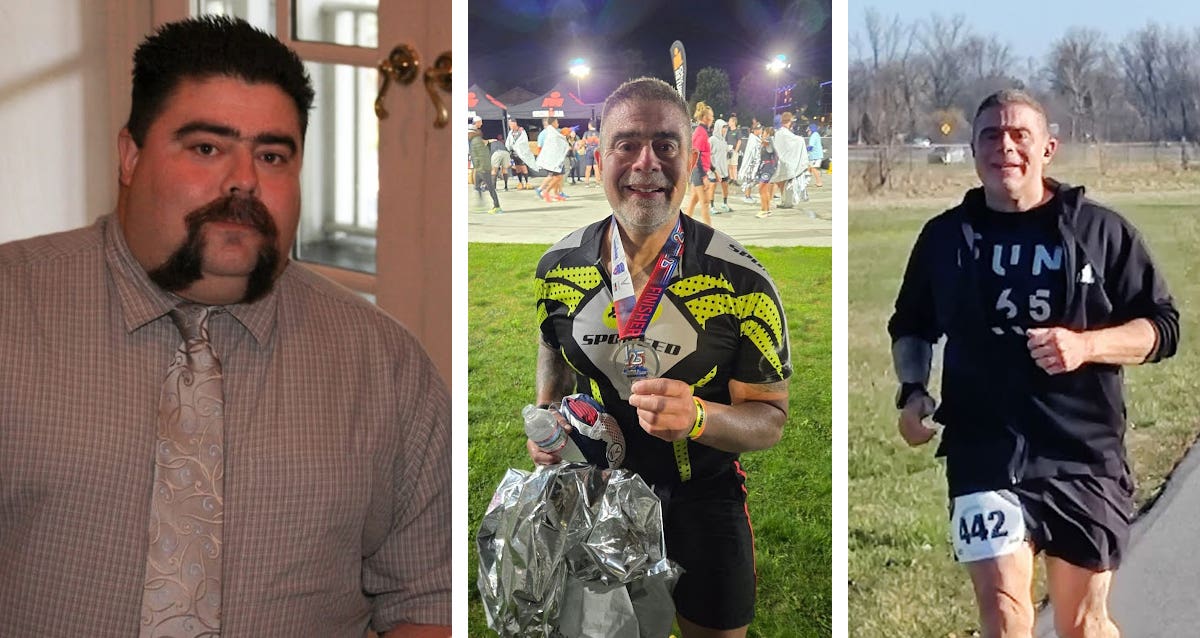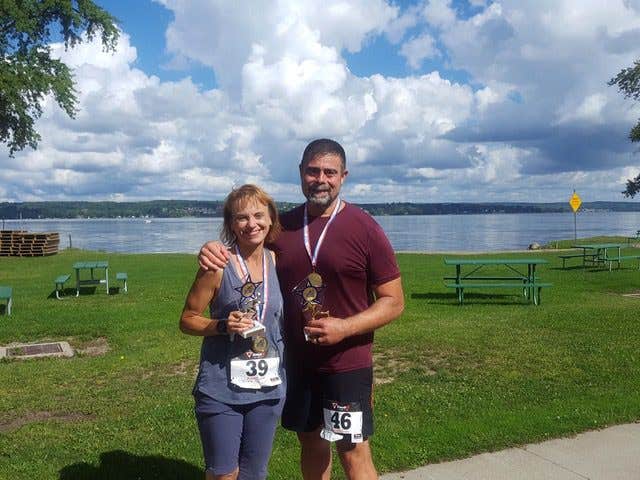
13 Years Plant-Based: The Most Important Lessons I’ve Learned Along the Way
Editor’s note: After adopting a plant-based diet in 2012, Tim Kaufman reversed multiple chronic conditions and lost nearly 200 pounds, a remarkable transformation that he shared with Forks Over Knives in 2016. Since then, Kaufman has continued to inspire others through his blog and books. Now, more than a decade into his plant-based journey, he reflects on what he’s learned.
I was going to die, and it would be in a matter of months, not years. My doctor knew it—and so did I. So, what saved my life? I stopped eating processed junk and started eating whole plant foods. It was that simple. But in the years that passed, I learned that simple doesn't always mean easy.
I’m not an expert, and I’m far from perfect, but here are a few things I’ve learned on my way to losing 200 pounds, getting off more than 20 prescription medications, and going from nearly immobile to crossing the finish line of an Ironman triathlon.
1. Small changes over time will take you places you never thought possible.
We love to focus on results; it’s human nature. Results are exciting and can keep us motivated—but they can also let us down. There are so many factors beyond our control: setbacks, injuries, circumstances, timing. That’s why shifting our focus from results to the process can change everything.
When we focus on small, consistent, incremental changes, something powerful happens: We stop needing motivation. The process becomes the goal. And over time, those small changes add up, and results become the natural byproduct.
Control the controllables. You may not be able to control an injury, a family event, or a work emergency. But you can control what you eat and how you respond to circumstances. That’s where the power lives.
Little steps lead to big places.
2. Perfectionism is your worst enemy.
No matter what you think, you will not be perfect with your diet or lifestyle. And that’s OK.
I’ve seen too many people sitting on the sidelines simply because they couldn’t be perfect. In their minds, if they couldn’t do it exactly right, there was no point in doing it at all.
Sometimes, I think we use perfection as an excuse to go completely off the rails. You slip up and eat something you shouldn’t—and instead of brushing it off, you turn it into an all-day free-for all. That day becomes a week. That week becomes a month.
But here’s the thing: Life gets messy. We’re not going to win 100% of the battles. The good news? We don’t have to.
Just do your best. And whatever happens, remember this: Tomorrow, you wake up with a clean slate and another chance to strive for better.
Don’t let perfection get in the way of progress. Give yourself the grace to screw up—and the urgent responsibility to get back up.
3. The “little” boring things are the key to HUGE success.
“This is the hack that gurus don’t want you to know”: You’ve seen it. We all have. Social media is full of catchy lines like that, and they work. Why? Because we all want a magic pill. A shortcut. A quick fix. But after 13 years on this journey, I’ve learned the real “hack”: There isn’t one.
There’s no easy button. No secret sauce. No shortcut.
Most of the time, the things we need to do to move forward are the exact things we already know we should be doing. We’re just not doing them. And usually, they’re small. They’re boring. But they work. Meal planning, shopping lists, scheduled workouts. keeping junk food out of the house—not sexy, but incredibly effective.
The day I started mastering those “little” things, consistently, was the day momentum started to build. That’s when everything began to change.
So if you’re searching for the secret to success, don’t look for a supplement or shortcut. Look at your daily habits.
Focus on one small task at a time. Build it into a habit. Turn that habit into a lifestyle. Then repeat. That’s how you become unstoppable.
4. What got you to where you are may not get you to where you’re going next.
This was a tough one for me. When I was 200 pounds overweight and eating a horrific diet, I could eat as much whole plant food as I wanted and still see massive results. And it worked, until it didn’t.
As the weight came off, so did my caloric needs. Suddenly, my big portions of raw cashews, avocados, peanut butter, and seeds started to move the scale in the wrong direction. These are all healthy whole foods—but they’re also incredibly calorie-dense.
I remember being confused: Why am I eating the same things but getting different results? Thirteen years in, I’m still adjusting the knobs and tweaking the system. And I think that’s the critical part. Just because something got you to Point A doesn’t mean it’ll get you to Point B.
We have to be our own living science experiments. For some, that might mean cutting out peanut butter; for others, it might mean adding a spoonful of flaxseed to your morning oats. It’s the mindset of continuous improvement that keeps us from getting stuck—and moves us into what’s next.
What worked before may not work forever, but progress lives in constant adjustment.
5. Your competition is in the mirror, not on social media.
When I began my journey, social media was just starting to grow. There were a few “plant-based” heroes, but nothing like the wave we see today. Everyone loves an inspiring success story, as we should. Stories like that show us what’s possible.
But comparison is a dangerous game.
Social media gives us the highlight reel. It’s easy to post your absolute worst photo next to your absolute best. And when we see those transformations, we assume that’s the whole story. It looks effortless. And when we struggle, we assume we’re doing something wrong because we don’t measure up.
My own before-and-after photos have been shared all over the internet. They inspire people with physical challenges, chronic illness, or excess weight—but they don’t tell the whole story.
It hasn’t been easy. I still struggle with food addiction. I still have days where I feel like an impostor.
It takes practice. And sometimes, I fail.
But the best person I can compare myself to is the person I was yesterday. And if you’re going to look in the mirror at your competition, you might as well ask: “What can I do today to make myself better tomorrow?”
6. Changing your diet means nothing if you’re not changing how you live.
For me, this is the big one. If you can grasp this idea and put it into action, it will change everything.
Sure, a whole-food, plant-based diet might save your life—but what kind of life is it saving you for?
As we move along in our journey, the key is to flip the focus from how we eat to how we live. When you spend your energy building an exciting, vibrant life by design, the food becomes a must-have tool to sustain that life.
Isn’t that exciting? Wouldn’t you rather focus on adventures, like hiking in beautiful places, taking up kayaking, or finally doing whatever it is you’ve always wanted to do—instead of thinking about how much broccoli and black beans you ate today?
When I learned to build a life that requires a healthy diet to support it, everything changed. Now it’s second nature. I wake up every day grateful for another opportunity to live fully and with purpose.
Keep your food simple—and your life exciting.
My favorite part of this lifestyle is that it’s out there for anyone. You don’t have to be perfect, but you do have to start. Don’t wait for tomorrow. Start today, and start exactly where you are. Keep showing up, and you’ll be amazed at where your journey takes you.

About the Author

About the Author
Tim Kaufman
Join our mailing list
Get free recipes and the latest info on living a happy, healthy plant-based lifestyle.
By providing your email address, you consent to receive newsletter emails from Forks Over Knives. We value your privacy and will keep your email address safe. You may unsubscribe from our emails at any time.